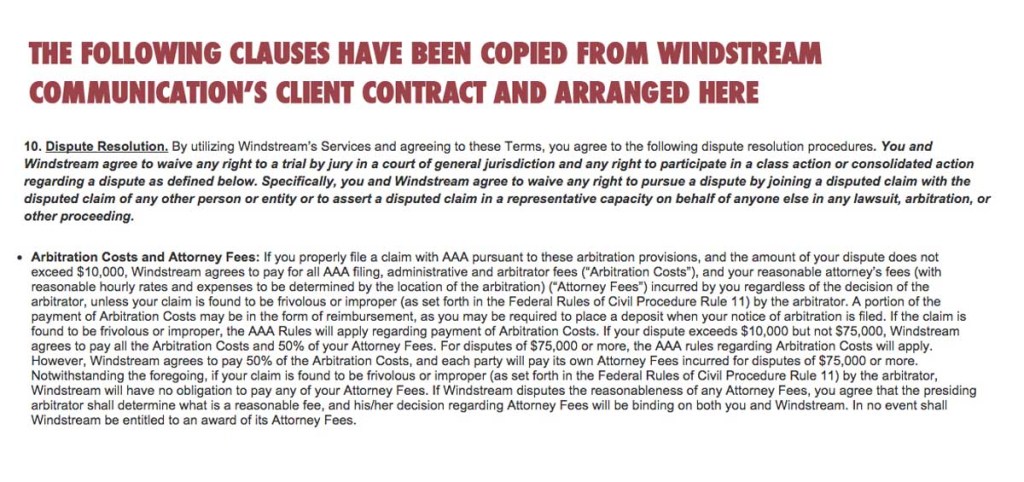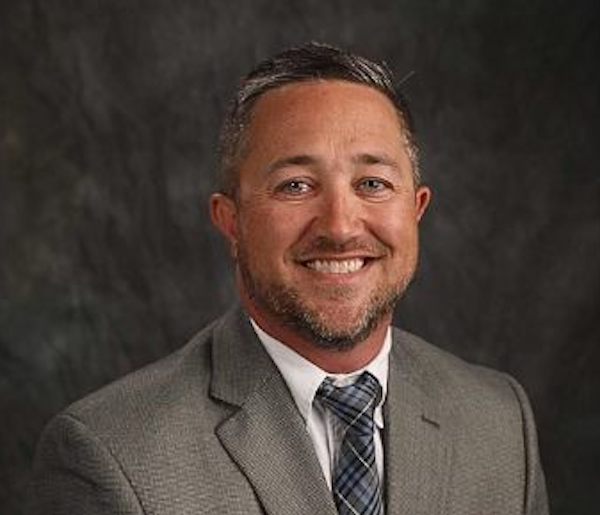Windstream arbitration: Could legal action lead to improved Internet speeds for residents?
Published 12:00 pm Friday, June 26, 2015

- Shown are two clauses from Windstream's client contract that illustrate points made by Attorney Whitney Seals in the article. The first states that clients agree to not take part in class action suits against the company. The second states that dispute resolution will take place through arbitration, paid for by Windstream.
Hundreds of St. Clair County residents have signed up to participate in a legal matter they hope will improve their Internet connectivity and download speeds. Launched from a collaboration of three area attorneys, the case targets Windstream Communications, an Arkansas-based Internet service provider (ISP) that offers its products in a swath that runs through the north and west of the county.
Attorneys say their goal is to motivate Windstream to upgrade its infrastructure in these areas, as residents have voiced numerous complaints. People using Windstream locally claim in mass that upgrades performed at their homes or businesses have never improved Internet speeds, despite promises from the company often accompanied by fees and rate increases.
Windstream, in response, said that new leadership is making infrastructure upgrades a top priority, and improvements are coming to St. Clair regardless of any legal actions that arise. This hasn’t deterred attorneys though, who said Windstream has made similar promises in the past to its local customers that it hasn’t upheld.
So, what happens now?
Network Error?
Windstream Communications owns a fiber-optics network that, according to maps on the company website, runs in St. Clair County from Leeds to Ashville. In many rural areas, it’s the only ISP available, and based on these maps the company operates largely in rural areas of the state. Although its lines run all over Alabama, it offers service mainly in three counties – St. Clair, Tallapoosa and Elmore.
Fiber-optic lines should easily provide download speeds in the double digits, but many local customers said their speeds have never topped 3 megabytes per second (mb/s). Some even stated that speed tests at their homes rarely topped 1 mb/s.
The reason for this, according to Windstream spokesperson Michael Teague, dates back to the advent of smartphones and the public’s demand for tower-based data networks. Many of the lines Windstream uses in the county are made of copper, which has a limited capacity for data. Fiber runs to distribution points, but copper carries the signal into homes.
Teague said these lines were never upgraded because the industry believed demand would skyrocket for Internet service on mobile devices. So, in the 2000s, the company focused on running fiber lines to cellphone towers, thinking the public would be satisfied with faster mobile data speeds and many would stop home-based service.
But, he said, Wi-Fi threw a curveball at the industry.
“Industry-wide, we found people still want that broadband delivered to their homes so they can stream multiple devices wirelessly,” Teague said. “It created a kind of shift in the thinking, and it’s come back around.”
Teague said the industry spent billions of dollars on running lines to cell towers, taking its focus away from improving infrastructure into homes. However, he said with new leadership in the company, the focus is returning.
Since taking over last year, new Windstream President and CEO Tony Thomas has saved the company millions by spinning off a new company to control distribution assets.
“What that allowed us to do was pay off a lot of debt, roughly several million in funds that we can reinvest back into network,” Teague said, adding that Thomas primary push right now is to improve infrastructure.
This week, Teague released a statement that said Windstream has completed 15 network improvement projects in St. Clair County since January 2014, and the company has 32 more upgrades planned by the end of the year, “barring any unforeseen circumstances.”
Teague did not respond to a request to identify these projects, but did say the company is upgrading lines by using a process called “bonded copper.” This offers a way to increase speeds by dividing the signal and offers the company a solution that isn’t as costly as running fiber-optic lines to homes and businesses.
Service Interruptions
But again, the problem for many residents is a lack of faith, and it’s driving them to join the proposed case against Windstream. In St. Clair County, no one interviewed provided a positive comment about the company’s service. People reported problems beyond streaming interference, claiming slow speeds have forced them to drop online college courses or interfered with home-based businesses.
Three lawyers have joined in what they describe as an effort to improve Windstream’s infrastructure in the county, and the trio has held meetings throughout the area in June. The group is led by Dustin Kittle, a St. Clair County resident and attorney with Beckum Kittle LLP in Birmingham. Attorney JoAnn Higginbotham of Higginbotham Law Firm LLC in Moody and Whitney Seals of Pate and Cochran LLP in Birmingham are also helping with the case.
Higginbotham, owner of the Sneaky Pete’s in Moody, said she joined the effort because Internet connectivity problems she experienced while using Windstream negatively impacted her business, adding that she understands other residents’ complaints.
“Windstream is the only game in town where my home is,” she said. “It’s like taking candy from a baby.”
So, the plan devised by these attorneys is somewhat based on an investigation by the Governor’s Office of Consumer Protection into claims of false advertisement from Windstream that led to a $600,000 settlement.
“This is essentially a truth in advertising case,” John Sours, administrator of the Governor’s Office of Consumer Protection, said of the case in an article on stopthecap.com. “What consumers thought they were getting from a major company was significantly different from what they allegedly received.”
For St. Clair County, the attorneys are focusing on the same message – area residents are not getting what they pay for. Whitney Seals said clients who joined the effort report being offered upgrades to their Internet speeds up to 12 mb/s. However, they report tests reveal their speeds – no matter the package they purchase from the company – are rarely above 3 mb/s.
Seals said clients have filed complaints with the Public Service Commission and the Federal Communications Commission without results. That’s why this legal effort has gained ground so rapidly, evolving in a matter of weeks.
“We want to work with the folks in these communities,” Seals said. “ Some can’t get 1 mb/s and they’re paying for 12. We want to at least get those people beyond dial-up speeds. Or, if Windstream can’t do it, at least admit they can’t and charge an appropriate rate.”
Seals said people are signing on because nothing else they’ve tried has generated the results they were seeking. But, he admitted there was no guarantee legal action would either.
Reconnecting
The plan going forward, Seals said, is relatively open-ended at the moment, but the primary objective of these attorneys is to force Windstream to make a tough decision. They’re amassing clients to possibly proceed into arbitration, which is where cases are discussed before a hired judge rather than in open court. This makes the process more private and often more costly.
The reason for exploring this option is based on the contract Windstream has its customers sign. Seals said there is a strongly worded provision that prevents customers from joining a class action suit against the company. However, another provision reads that Windstream will pay all legal fees associated with arbitration claims. These provisions have been confirmed.
Seals said it’s unlikely any clients would see monetary awards from joining the case, as the plan involves using arbitration simply to put Windstream between a rock and a hard place.
“The [American Arbitration Association] sets fees for these types of cases. It can be anywhere from a couple hundred dollars to $2,000 depending on the type of case and the arrangement,” he said. “But the motivator is as fees mount, and each fee is Windstream’s responsibility to pay, it might make more sense to fix everything rather than fight its customers.”
So, each client that signs up to participate in the matter would represent an individual case, and each case would require a fee that Windstream, based on the contract, would be required to pay. If 1,000 people signed up, and each fee were $1,000, the cost for just the arbitration fees would be $1 million.
Seals said presenting a figure like that to the company could provoke a desire to simply improve infrastructure instead of continuing the fight.
“A lot of this is based on what the Windstream contract says – it’s what controls the whole thing.”
A timeline has not been set for proceeding with any legal action. To learn more about the client agreement and the legal matter being pursued, contact Attorney Dustin Kittle at (205) 358-3100 or visit beckumkittle.com. To learn more about Windstream Communications, visit windstream.com.
The two maps pictured show Windstream Communication’s coverage area in Alabama, as well as its fiber-optics network in St. Clair County. Left: Windstream offers service that’s mostly contained in three Alabama Counties – Elmore, Tallapoosa and St. Clair. Right: This map details the company’s fiber-optics lines that run throughout the county, concentrated in a diagonal line from Leeds to Ashville.
Links to research gathered for this article:
› View the current Client Agreement with local attorneys: Some provisions have been removed or edited.
› View the company’s Better Business Bureau profile. More than 1,800 BBB complaints have been filed against Windstream in the past three years.
› View Windstream’s Interactive Fiber Network Map. The company offers service in 18 US states.
› View Windstream’s Client Agreement. The clauses dealing with Dispute resolution begin at item 10.
› View the company’s 2014 SEC filing. This report shows with the company’s declining revenue – from $6.12 million in 2012 to $5.83 million in 2014. It also shows the company suffered a $40 million loss last year.



